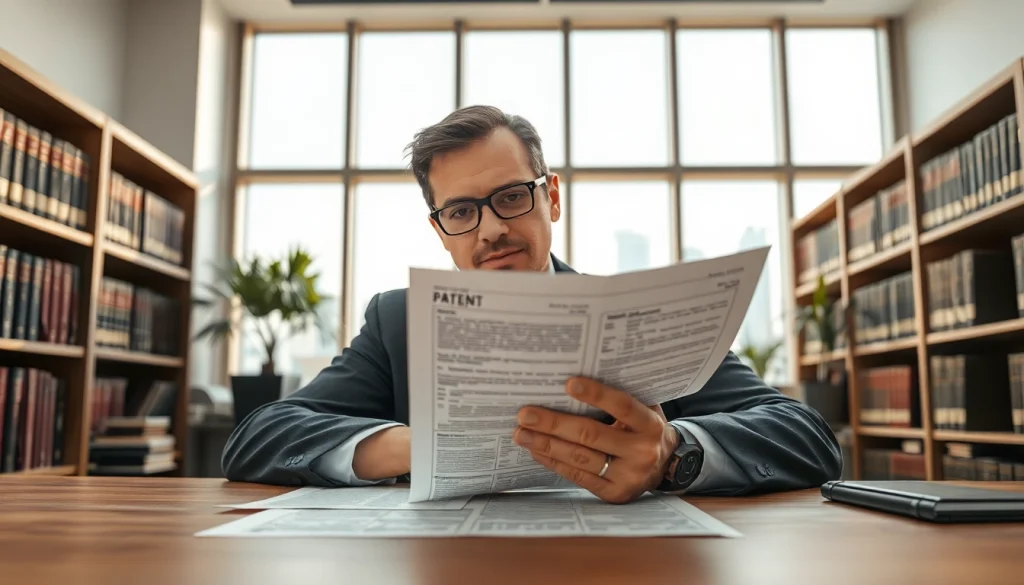How an Intellectual Property Lawyer Protects Your Innovations in a Competitive Market

Understanding the Role of an Intellectual Property Lawyer
In today’s competitive business environment, protecting your creative innovations and formulations is more essential than ever. This is where the expertise of an intellectual property lawyer becomes invaluable. These legal professionals specialize in ensuring that your intellectual creations, whether they are inventions, brands, or artistic works, receive the protection they deserve under the law. This section will provide an overview of intellectual property, the various types of intellectual property rights, and the core responsibilities of an intellectual property lawyer.
What Is Intellectual Property?
Intellectual property (IP) refers to creations of the mind, such as inventions, literary and artistic works, designs, symbols, names, and images used in commerce. Intellectual property is foundational to innovation and creativity, providing legal protection to creators and inventors that encourages the development of new ideas and products. IP can be broadly classified into categories, each with distinct legal protections designed to match the needs of different types of innovations.
Types of Intellectual Property Rights
Understanding the various types of intellectual property rights is crucial for effective protection:
- Patents: These grant inventors exclusive rights to their inventions, preventing others from making, using, or selling the innovation without permission.
- Trademarks: These protect brand names and logos that distinguish goods and services in the marketplace, ensuring customers can identify the source of their purchases.
- Copyrights: Copyright laws protect original works of authorship, such as books, music, software, and visual arts, giving the creator rights to reproduce, distribute, and display their work.
- Trade Secrets: These are practices, formulas, processes, or designs that provide businesses with a competitive edge and are protected as long as they remain confidential.
Key Responsibilities of an Intellectual Property Lawyer
Intellectual property lawyers play a multifaceted role in safeguarding creations. Their key responsibilities include:
- Advising clients on IP rights and potential infringements
- Assisting with the registration of patents, trademarks, and copyrights
- Conducting IP audits to assess the strength and weaknesses of a client’s IP portfolio
- Drafting licensing agreements and contracts related to IP
- Representing clients in disputes related to infringement and litigation
Why You Need an Intellectual Property Lawyer
Having a qualified intellectual property lawyer on your side is critical for several reasons. They play an essential role in securing your innovations and navigating the complexities of IP law.
Securing Your Innovations
Innovations are not just ideas; they are economic assets. Protecting your innovations ensures that you retain the exclusive rights to them, preventing others from benefiting from your hard work. An intellectual property lawyer can help assess the best types of protections for your creations, ensuring you take the necessary legal steps to secure your intellectual property rights.
Avoiding Common Legal Pitfalls
Many entrepreneurs and creators make common legal mistakes that can lead to losing their intellectual property rights or facing costly litigation. For example, registering a trademark without conducting a proper search can lead to infringement claims. An experienced intellectual property lawyer can provide guidance on best practices, reducing the likelihood of these errors and protecting your business from legal threats.
Strategic Planning for Intellectual Property
Effective IP strategy is about more than just protecting existing ideas; it involves proactive planning for future growth and innovation. An intellectual property lawyer can work with you to develop a comprehensive IP strategy that aligns with your business goals, identifying key areas for protection and providing advice on licensing or collaborations that can enhance your market position.
How to Choose the Right Intellectual Property Lawyer
Selecting the right intellectual property lawyer can significantly impact your ability to protect and maximize the value of your creations. When looking for an appropriate legal representative, consider the following factors:
Assessing Experience and Expertise
Before hiring an intellectual property lawyer, assess their experience in your specific industry and with the types of IP relevant to your business. Look for lawyers who have a proven track record in handling cases similar to yours, as their expertise will contribute to better outcomes.
Evaluating Client Testimonials and Case Studies
Reading client testimonials and examining past case studies can give you insight into an intellectual property lawyer’s effectiveness and approach. Look for reviews that highlight successful outcomes and a strong client lawyer relationship, as these are indicative of the lawyer’s dedication and capability.
Understanding Fee Structures and Services Offered
Intellectual property lawyers may charge their clients in various ways, such as hourly rates, flat fees, or contingency fees. Understanding their fee structure and what services are included is crucial before engaging their services. Be sure to inquire about additional costs that may arise during the process, such as filing fees or expenses related to litigation.
Common Challenges Faced by Intellectual Property Lawyers
Even with their expertise, intellectual property lawyers face a variety of challenges in their field. This section highlights some of these hurdles and discusses how effective lawyers navigate them.
Navigating Complex Legal Landscapes
The landscape of intellectual property law can be highly complex, particularly as laws may vary significantly from one jurisdiction to another. Intellectual property lawyers must stay informed about the latest regulations and interpret them in light of specific client situations. Failing to do so can result in lost rights or failed litigation efforts. Continuous education and training are essential for effective practice.
Dealing with Infringement Cases
Infringement cases can be emotionally and financially draining. An intellectual property lawyer must balance the aggressive protection of their client’s rights with the realities of legal proceedings. Developing effective strategies for negotiation or litigation can greatly influence the case’s outcome. Moreover, a sound understanding of the business implications of IP infringement can help tailor the legal approach to suit the client’s best interests.
Staying Updated with Legal Developments
The realm of intellectual property law is continuously evolving, especially with the rapid advancement of technology and globalization. Intellectual property lawyers must keep pace with legal updates, new precedents, and international treaties that may affect IP rights. This requires dedication to ongoing legal education and engagement with professional organizations.
The Future of Intellectual Property Law
As technology and global commerce evolve, so too do the challenges and opportunities within intellectual property law. Understanding these trends is vital for both IP lawyers and their clients.
Impact of Technology on Intellectual Property
Technology plays a pivotal role in reshaping intellectual property law. The rise of the digital economy presents both opportunities for new inventions and challenges related to protecting digital content and software. For instance, the advent of blockchain technology has implications for the registration and enforcement of IP rights. Lawyers must now learn to apply traditional IP laws to modern technological contexts, ensuring that creators remain protected in an increasingly digital world.
Globalization and Intellectual Property Challenges
With the globalization of business and the internet, protecting intellectual property across borders has become more challenging. Variations in IP laws from one country to another complicate the enforcement of rights. An intellectual property lawyer must understand how to navigate these international waters, including treaties and agreements like the TRIPS Agreement, which aims to standardize IP protections globally.
Trends in Intellectual Property Legislation
Emerging trends in legislation, such as increased protection for traditional knowledge and indigenous intellectual property rights, suggest a shift in how IP law is approached. Intellectual property lawyers must adapt to these changes and anticipate how new laws may impact their clients. Moreover, proactive engagement in legislative processes can help shape future laws to better serve innovators and creators.







